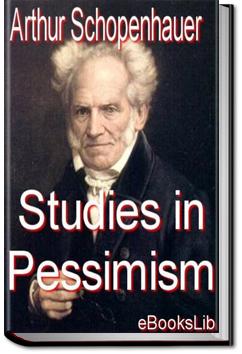UNLIMITED Audiobooks and eBooks
Over 40,000 books & works on all major devices
Get ALL YOU CAN for FREE for 30 days!
Studies in Pessimism
Arthur Schopenhauer
Book Overview:
Arthur Schopenhauer, an early 19th century philosopher, made significant contributions to metaphysics, ethics, and aesthetics. His work also informed theories of evolution and psychology, largely through his theory of the will to power – a concept which Nietzsche famously adopted and developed. Despite this, he is today, as he was during his life, overshadowed by his contemporary, Hegel. Schopenhauer’s social/psychological views, put forth in this work and in others, are directly derived from his metaphysics, which was strongly influenced by Eastern thought. His pessimism forms an interesting and perhaps questionable contrast with his obvious joy in self-expression, both in the elegance of his prose and in his practice of playing the flute nightly.
His brilliance, poetry, and crushing pessimism can be seen immediately in this work, as for example in this claim from the first chapter: “The pleasure in this world, it has been said, outweighs the pain; or, at any rate, there is an even balance between the two. If the reader wishes to see shortly whether this statement is true, let him compare the respective feelings of two animals, one of which is engaged in eating the other.”
Arthur Schopenhauer, an early 19th century philosopher, made significant contributions to metaphysics, ethics, and aesthetics. His work also informed theories of evolution and psychology, largely through his theory of the will to power – a concept which Nietzsche famously adopted and developed. Despite this, he is today, as he was during his life, overshadowed by his contemporary, Hegel. Schopenhauer’s social/psychological views, put forth in this work and in others, are directly derived from his metaphysics, which was strongly influenced by Eastern thought. His pessimism forms an interesting and perhaps questionable contrast with his obvious joy in self-expression, both in the elegance of his prose and in his practice of playing the flute nightly.
His brilliance, poetry, and crushing pessimism can be seen immediately in this work, as for example in this claim from the first chapter: “The pleasure in this world, it has been said, outweighs the pain; or, at any rate, there is an even balance between the two. If the reader wishes to see shortly whether this statement is true, let him compare the respective feelings of two animals, one of which is engaged in eating the other.”
How does All You Can Books work?
All You Can Books gives you UNLIMITED access to over 40,000 Audiobooks, eBooks, and Foreign Language courses. Download as many audiobooks, ebooks, language audio courses, and language e-workbooks as you want during the FREE trial and it's all yours to keep even if you cancel during the FREE trial. The service works on any major device including computers, smartphones, music players, e-readers, and tablets. You can try the service for FREE for 30 days then it's just $19.99 per month after that. So for the price everyone else charges for just 1 book, we offer you UNLIMITED audio books, e-books and language courses to download and enjoy as you please. No restrictions.
Between the ethics of the Greeks and the ethics of the Hindoos, there is a glaring contrast. In the one case (with the exception, it must be confessed, of Plato), the object of ethics is to enable a man to lead a happy life; in the other, it is to free and redeem him from life altogether—as is directly stated in the very first words of the Sankhya Karika.
Allied with this is the contrast between the Greek and the Christian idea of death. It is strikingly presented in a visible form on a fine antique sarcophagus in the gallery of Florence, which exhibits, in relief, the whole series of ceremonies attending a wedding . . . Read More
Try now for FREE!

"Love your service - thanks so much for what you do!"
- Customer Cathryn Mazer
"I did not realize that you would have so many audio books I would enjoy"
- Customer Sharon Morrison
"For all my fellow Audio Book & E-Book regulars:
This is about as close to nirvana as I have found!"
- Twitter post from @bobbyekat



Community Reviews
Skip the nonsense of " On Women " Chapter, and the book will be interesting.
کتاب شامل نه چپتر است، اگر مزخرفات چپتر "on women" و "on noise" را نادیده بگیریم کتابی بسیار جالب و جذاب پدید میگردد.
"the word person is commonly used to denote a human being. The real meaning of persona is a mask, such as actors were accustomed to wear on the ancient stage ; and it is quite true t
The original cranky old man. This book is at least amusing with all of his rants and raves. The message however can easily be summed up as: "Life sucks and than you die." "Women are only good for one thing, and we all know what that is." Than finally, "people make too much damn noise."
Now get off my
Bitter syllogisms & paralogisms
Contents:
- Pointlessness of existence
- The meaning and value of suicide
- The negative value of pleasure
- The influence of education on our way to perceive the world...
- The inferiority of women (...)
- Rambling thoughts about noise
- Superiority complex
A few quotes:
'They
Read it while in a depressive mood for the full effect. I picked this one up for the obvious reason that Schopenhauer's pessimism is one of his most famous and unique philosophical trends. Influences from India are obvious to those familiar with the concepts of "taṇhā" (thirst/desire) "maya" (illusi
Why does his pessimism uplift me? I think because he points out our psychological weaknesses, it allows you to step outside the box to see yourself, which always feels great.
As long as you ignore Schopenhauer's chauvinism in his essay "On Women", this is a really good book.